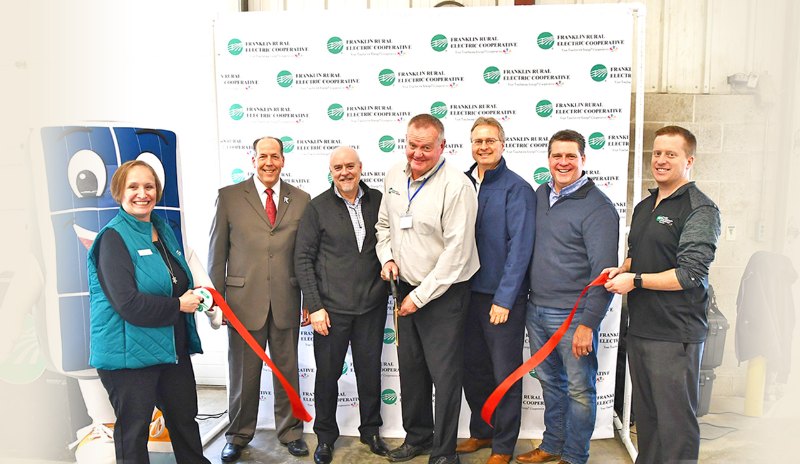New Financing Mechanism Makes Solar a “Win-Win-Win” for Franklin REC

Iowa’s Franklin Rural Electric Cooperative held a ribbon-cutting ceremony to celebrate the completion of three, new 149-kW solar arrays financed through an innovative arrangement that spread the benefits around.
“In 2016, our G&T, Basin Electric Power Cooperative, offered a program to members to purchase the power produced from renewable energy projects for 5 cents per kWh, so long as each project was under 150 kW,” explains Franklin REC General Manager Becky Bradburn. “We built a single array, but soon realized it made good economic sense to add more.”
The cooperative had tapped New Clean Renewable Energy Bonds to finance the first project. With that program no longer available, they looked to CFC for other options for future solar additions.
sCOOP Program Lets Franklin Reap Tax Benefits
Franklin’s latest solar project is financed using the Solar Cooperative Community Projects (sCOOP) program, a structure developed in the early-2000s by CFC and the National Renewables Cooperative Organization (NRCO) to enable tax-exempt electric cooperatives to benefit from federal tax incentives for renewable projects.
With the program, Franklin receives power from the facility under a power purchase agreement that reflects the benefit of the tax credit. The project is co-owned through a partnership of the subsidiary of the electric cooperative along with a taxable investor that can use the tax incentives. In this case, RECORETM, formerly Tidewater Energy Services, a for-profit subsidiary of Virginia-based Community Electric Cooperative, is the investor.
The Savings Really Add Up
“The sCOOP program is a great financing opportunity for us,” Bradburn says. “Franklin’s subsidiary company and RECORE will share in the upfront costs of constructing the arrays. In return for their investment, RECORE will be able to take advantage of the investment tax credits that otherwise would not be available.” Franklin receives the power from the project with pricing terms that reflect the benefits of the tax incentives.
“We could easily save $15,000 to $20,000 in the first year alone,” Bradburn adds.
CFC Provided Advice, Interim Financing
CFC provided bridge financing during the construction period. “CFC helped make this project possible by providing easy access to a line of credit that we could draw on to pay for project milestones as they were completed,” Bradburn explains.
She adds: “CFC was extremely helpful in explaining our options for financing and helped us far in advance. That was very helpful when the project started moving forward, because we were able to receive funds the next day, if needed.”
CFC staff introduced Franklin to NRCO to help assist them in the planning, contracting and overseeing construction of the project. NRCO will also support the project by providing independent administrative and asset management services during the operation of the project.
“NRCO guided us and made sure we had all the agreements in place to meet the IRS rules for this transaction,” Bradburn says. “The NRCO team also provided us with templates for the legal agreements, which saved a lot of time and legal fees.”
Franklin, Members See Immediate Benefits
The benefits for Franklin REC and its members are expected to be immediate. “This is a great win-win-win for our members, the environment and our cooperative,” Bradburn concludes. “It’s good for our members’ pocket books because we’re able to generate electricity for about 1 cent per kWh versus our current cost of 7 cents to purchase energy. It’s good for the environment because there is zero carbon footprint from the array. And it’s good for the co-op because it diversifies our generation mix and helps reduce our demand costs by better matching our load in the heat of the summer.”
Greg Starheim, CFC senior vice president for Business and Industry Development, notes, “The sCOOP structure has been a great financing tool to minimize the cost of solar-generated power for electric cooperatives. We’re delighted to be working with Franklin REC, RECORE and NRCO on this project, keeping the benefits within the cooperative family.”
Published Jan. 27, 2020, in CFC Solutions News Bulletin.